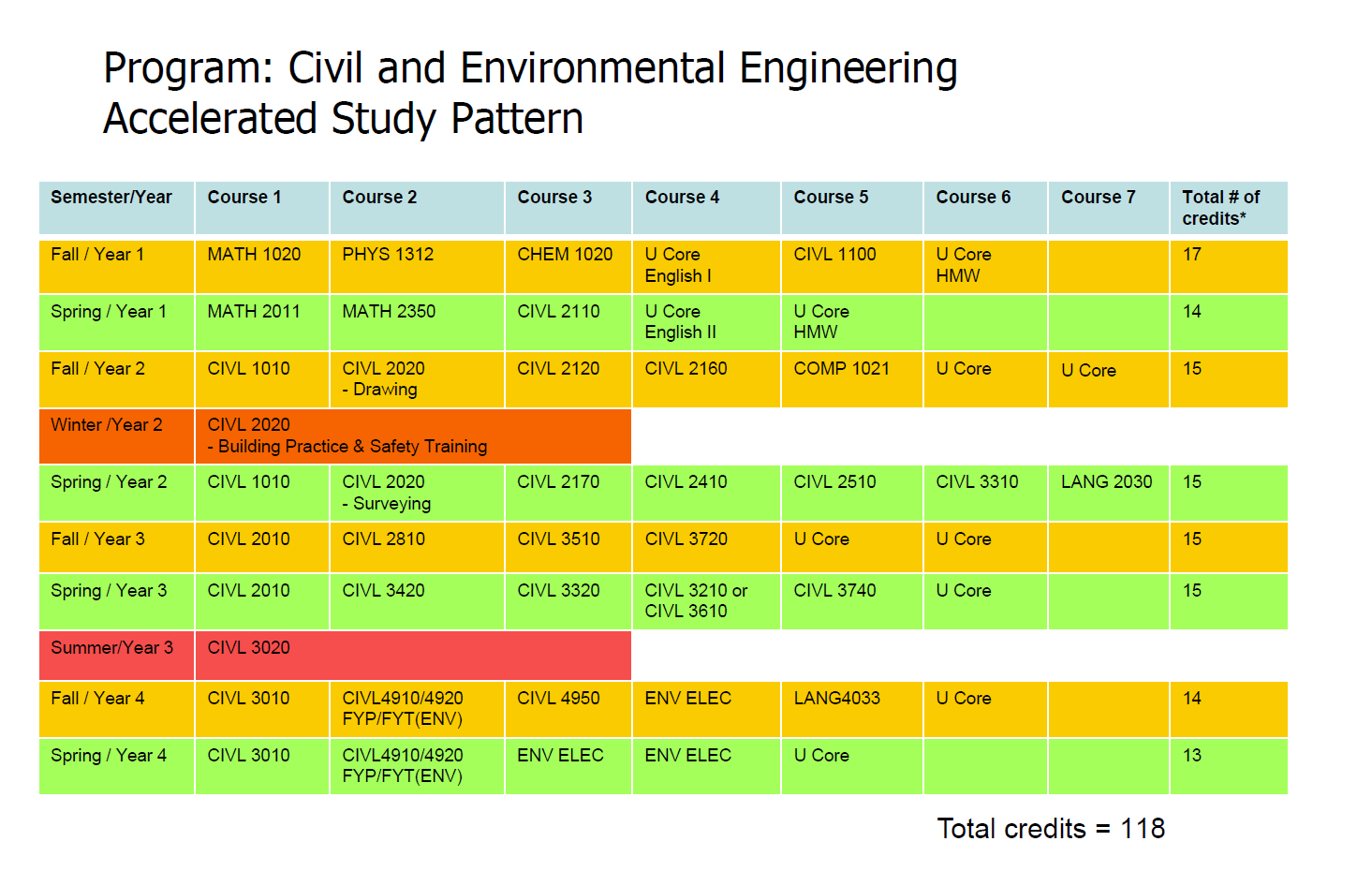BEng in Civil and Environmental Engineering
Program Objectives
|
PEO1. |
Provide students with professional skills in the design, construction and management of the civil infrastructure, as well as an awareness of environmental sustainability. |
|
PEO2. |
Train students with good communication skills so they can work effectively in large projects involving different parties and professions. |
|
PEO3. |
Challenge students with research-type and open-ended design problems to stimulate self-learning and innovative problem solving skills. |
|
PEO4. |
Expose students to real world engineering projects as well as cutting edge research to improve their understanding of the profession and technological advancements that can improve current practice. |
Program Outcomes
|
PO1. |
Acquire fundamental knowledge in mathematics and science on which civil and environmental engineering research and practice are based |
|
PO2. |
Understand fundamental principles of engineering science relevant to civil and environmental engineering disciplines |
|
PO3. |
Acquire an ability to conduct experiments, analyze and interpret results, and appreciate the importance of experimental data in establishing empirical relationships and parameters for analysis and design |
|
PO4. |
Acquire an ability to apply modern engineering and IT tools effectively and efficiently for engineering analysis, design and communication |
|
PO5. |
Develop an ability to identify and formulate civil and environmental engineering problems, and propose feasible solutions with an appreciation of their underlying assumptions, uncertainties, constraints, and technical limitations |
|
PO6. |
Develop technical competency to design civil and environmental engineering components and systems, with an understanding of the principles behind the design methodologies |
|
PO7. |
Develop an appreciation of the breadth of civil and environmental engineering, and acquire basic knowledge in several disciplines to enable effective performance within a multidisciplinary work environment |
|
PO8. |
Obtain in-depth knowledge in the area of environmental engineering |
|
PO9. |
Develop an ability to communicate and present ideas effectively, including oral, written, and technical writing skills, and to function effectively within and among teams with a variety of backgrounds and interests |
|
PO10. |
Recognize the importance of seeking further specialization within civil and environmental engineering and the need for life-long learning |
|
PO11. |
Instill a deep sense of professional responsibilities and the importance of ethical and societal considerations, including public health, safety, environmental conservation, welfare etc. |
|
PO12. |
Develop an ability to stay abreast of contemporary issues, both nationally and internationally, and the awareness of the impact of engineering in these areas. |
HKIE Expected Attributes for Graduates
|
A. |
An ability to apply knowledge of mathematics, science, and engineering appropriate to the degree discipline |
|
B. |
An ability to design and conduct experiments, as well as to analyse and interpret data |
|
C. |
An ability to design a system, component or process to meet desired needs within realistic constraints, such as economic, environmental, social, political, ethical, health and safety, manufacturability and sustainability |
|
D. |
An ability to function on multi-disciplinary teams |
|
E. |
An ability to identify, formulate and solve engineering problems |
|
F. |
An ability to understand professional and ethical responsibility |
|
G. |
An ability to communicate effectively |
|
H. |
An ability to understand the impact of engineering solutions in a global and societal context, especially the importance of health, safety and environmental considerations to both workers and the general public |
|
I. |
An ability to stay abreast of contemporary issues |
|
J. |
An ability to recognize the need for, and to engage in life-long learning |
|
K. |
An ability to use the techniques, skills, and modern engineering tools necessary for engineering practice appropriate to the degree discipline |
|
L. |
An ability to use the computer/IT tools relevant to the discipline along with an understanding of their processes and limitations |
Curriculum Handbook
The program curriculum is available in the (Students admitted in the current year / Students admitted in previous years).

Click here to download PDF version


Click here to download PDF version
TENTATIVE Two-year Course Offering Plan

Click here to view the plan in PDF version
Professional Recognition
The BEng in Civil and Environmental Engineering degree program offered by the Department of Civil and Environmental Engineering at the HKUST has been accredited by the Hong Kong Institution of Engineers (HKIE). Graduates are eligible to apply for Graduate Membership of the HKIE. After completing the HKIE training scheme, which normally takes three years, graduates of the CIEV program may apply for the examination to become Corporate Members of the HKIE. Graduates are eligible to join HKIE training in the disciplines of Civil (CVL), Environmental (ENV), Structural (STL) and Geotechnical (GEL).
